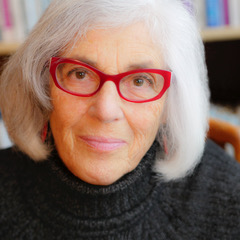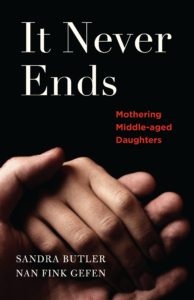Guest Post: Letter from a Good Enough Daughter by Sandra Butler, co-author with Nan Gefen, It Never Ends: Mothering Middle-Aged Daughters
 Dear Ma,
Dear Ma,
I miss you. There are so many things I want to tell you, so many conversations I didn’t know enough to have when you were still here. Sometimes I’ll put a picture of you on the side table and talk to you in my mind about what your granddaughters are doing in their lives, lives you never would have imagined for them. The one you feared would never be successful and able to make a living is thriving in work she loves. The other with a formal degree guaranteeing success has left the field she was trained for and moved into a more financially precarious world of caring for others. They live near one another now and after some awkward adjustments (you know how different they are!) have settled into a self-aware and accepting sisterhood. Neither of us ever would have imagined how their lives and their relationship have unfolded. All your fears were the wrong ones. Many of mine were too.
There’s a framed series of pictures of us dancing at your granddaughters wedding. We look so delighted with one another as we execute an enthusiastic jitterbug. She’s divorced now and remarried to a much better man. Those were hard years to be her mother and remain trusting that she would find her way. Seeing more than I could say, carefully choosing my words, knowing the weight they would carry. I knew better than to speak. And she did, eventually, find her way.
But you spoke and counseled compromise in each of my relationships, even as you knew that compromise with Daddy never served you. Each acquiescence to his needs took you further away from your own dreams of higher education and a cultured life. Did you imagine that taking your advice would turn out differently for me than it did for you? Or were you unable to speak the words of regret for all those compromises? Allow me to see you in such a vulnerable and disappointed way?
Once you whispered to me, “Sometimes I’m so lonely, I talk to the trees.” I remember putting my arm around you in an effort to be comforting, but really because I didn’t know what to say. I didn’t yet understand I might have invited you forward. Asked a question that might have allowed you to open further. You were just a little younger than I am now when you offered me your loneliness and I didn’t know what to do with it. I would now. I’m so sorry.
My life turned out so differently than you expected it to. I live happily alone and have lots of women friends to support and love me. I’m old now, almost 80 and am astonished nearly every time I pass a mirror. It’s true what you always said. “The inside me is half the age of the outside me.” The skin on my arms is growing mottled and paper thin. I bruise easily, like you. When you were my age, I took you to every beauty parlor within 20 miles, and can still see your disappointed expression when the hairdresser turned the chair around and you saw yourself in the mirror. What you saw was never satisfactory, because you still looked the same. Under the carefully arranged frosted blonde hair, you still had the face of an old woman. Now I too have a deeply lined face and my haircuts don’t make a difference. I know, because I’ve tried.
I haven’t been to the cemetery very much since you died. I hope that’s ok. It isn’t that you aren’t with me, or that I don’t think about you. It’s just that standing on a bit of grass on the other side of the country looking down at a small plot doesn’t bring you any closer than you already are. I asked my daughters if they would find comfort if I chose a burial site, but they said they didn’t need to have that sense of place any more than I do, so I’m going to be cremated and your granddaughters can scatter my ashes and create whatever ritual will give them comfort.
I tell them your stories, at least the ones I know whenever I can. They experienced you as their very powerful grandmother yet had very little sense of you as a hungry and ambitious girl from a poor family. A girl who wanted to be educated and have her own desk and her own money. It didn’t work out for you, but after a few false starts, it did for me. I want you to know that I carry you with me into all the places you wanted to but were unable to go. You didn’t get to have the life you dreamed of but, at least now, I have some parts of it. It’s such an irony. Here I finally am in my life, where I always wanted to be, and in a few short years, I’ll die.
You were a hard mother to have. And so was I. We were forceful, controlling, opinionated. And scared, insecure and overwhelmed. I miss you ma. I know what I want to say. What I want to ask. What I need to hear. And I’m left to imagine your words, to cradle them to me and know that’s the best I can do. I hope I was a good enough daughter. You were a good enough mother. We both did our best. I know we did.
 Sandra Butler is the author of Conspiracy of Silence: The Trauma of Incest. Her second book, Cancer in Two Voices, co-authored with Barbara Rosenblum, was the winner of the 1991 Lambda Literary Award. She is also the co-producer of the award-winning documentaries Cancer in Two Voices and Ruthie and Connie: Every Room in the House. She has two middle-aged daughters and a rich community of women friends. Her latest work, It Never Ends: Mothering Middle-Aged Daughters co-authored with Nan Fink Gefen (She Writes Press, 2017), provides readers with strategies and techniques they can adopt to balance their own aging alongside that of their daughters.
Sandra Butler is the author of Conspiracy of Silence: The Trauma of Incest. Her second book, Cancer in Two Voices, co-authored with Barbara Rosenblum, was the winner of the 1991 Lambda Literary Award. She is also the co-producer of the award-winning documentaries Cancer in Two Voices and Ruthie and Connie: Every Room in the House. She has two middle-aged daughters and a rich community of women friends. Her latest work, It Never Ends: Mothering Middle-Aged Daughters co-authored with Nan Fink Gefen (She Writes Press, 2017), provides readers with strategies and techniques they can adopt to balance their own aging alongside that of their daughters.















